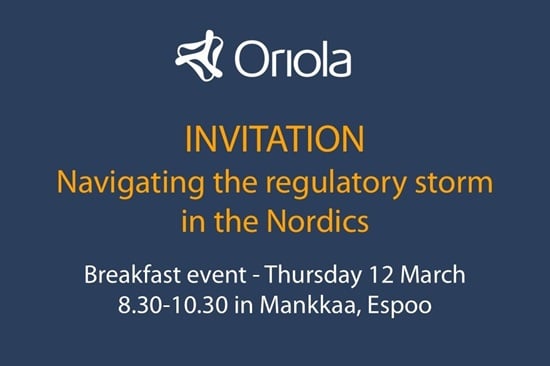New cancer study aims to promote the implementation of cost-effective cancer treatments
4.4.2019
The costs of cancer treatment in Finland have increased over the last ten years. The treatment of cancer has significant economic implications both for patients and their families and for society. Meanwhile, there is rather limited information about the effects of different types of cancer treatments on the everyday life of patients, which affects the entry of medicines onto the Finnish market. A new scientific cancer study will take a comprehensive look at the total costs of cancer treatment and at the effectiveness of treatment. The aim of the study is to promote the implementation of cost-effective cancer treatments.
The scientific cancer study is a joint project of the National Institute for Health and Welfare, the Association of Cancer Patients in Finland and Oriola. For the first time ever, data from national registers will be combined with patient-reported outcomes (PRO). The patient-reported data is gathered directly from patients through Oriola’s network of research pharmacies. The study started in February 2019 and is ongoing at the moment.
“What is especially interesting, is that the results also take into account the quality of life of the patients. This information is gathered through patient interviews. Based on the interim results, more than 90% of cancer patients reported high financial toxicity of cancer”, says Heli Salminen-Mankonen.
The final results of the study will bring new, long-awaited data that is needed for:
- Evaluating the direct and indirect medical costs of cancer in Finland
- Linking the total costs of the disease with patient-reported outcomes
- Guiding reimbursement decisions with an evidence-based rationale
- Comparing the outcomes of patients using different drug classes
- Seeing the patient perspective behind costs and outcomes by connecting patient experiences with registry data
The results of the study will also be applicable to Sweden
Even though the cancer study is carried out in Finland, it will be easy to apply the results to Sweden as well: both countries have similar patient profiles and high-quality healthcare systems with similar national treatment guidelines. In addition, Finland and Sweden have many other key strengths that can make them a uniquely suitable environment for studying Real World Evidence, such as national registers with a wide coverage and personal identification numbers that can be used to bring together data from different sources.
Heli Salminen-Mankonen, Head of Data Driven Business and Research, is happy to tell you more about the study.
Updated 14 Feb 2020

Heli Salminen-Mankonen
Head of Data Driven Business and Research +358 40 719 2945 heli.salminen-mankonen@oriola.com


